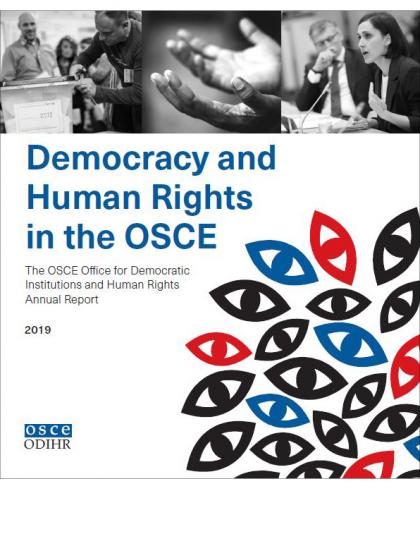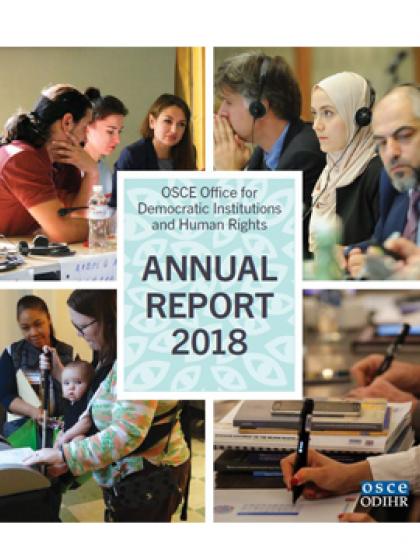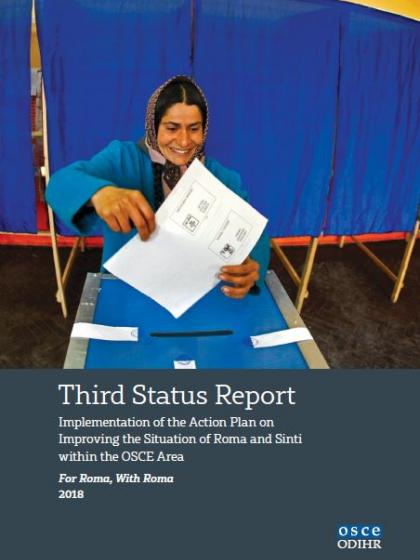Publications
Anti-Roma Hate Crime
Publishing date: 11 October 2021
Collections: Hate Crime Factsheets
Content type: Factsheet
Where we are: OSCE Office for Democratic Institutions and Human Rights
What we do: Roma and Sinti, Tolerance and non-discrimination
Publisher: Organization for Security and Co-operation in Europe
Intolerance and discrimination have affected Roma and Sinti communities for centuries, and continue to be a concern in the OSCE region, including harmful discourse and stereotyping. Too often, this intolerance can morph into anti-Roma hate crimes, ranging from anti-Roma graffiti to racially-motivated violence. Hate crime has a significant, long-lasting impact on victims, perpetuates inequality, and undermines security and social cohesion. Anti- Roma hate crimes send a message of exclusion not only to Roma and Sinti victims and their communities, but society as a whole. Everyone has a role to play in addressing anti-Roma hate crimes and all forms of intolerance and discrimination. This factsheet highlights the impact of anti-Roma hate crime and provides guidance on identifying such crimes.
OSCE/ODIHR Annual Report 2019
Publishing date: 19 March 2020
Collections: ODIHR Annual Reports
Content type: Annual report
Where we are: OSCE Office for Democratic Institutions and Human Rights
What we do: Combating trafficking in human beings, Democratization, Human rights, Education, Elections, Good governance, Countering terrorism, Gender equality, Migration, Policing, Reform and co-operation in the security sector, Roma and Sinti, Youth, Rule of law, Tolerance and non-discrimination
Publisher: Organization for Security and Co-operation in Europe
This report highlights the impact of activities carried out by the OSCE Office for Democratic Institutions and Human Rights (ODIHR) in 2019.
OSCE/ODIHR Annual Report 2018
Publishing date: 7 March 2019
Collections: ODIHR Annual Reports
Content type: Annual report
Where we are: OSCE Office for Democratic Institutions and Human Rights
What we do: Combating trafficking in human beings, Democratization, Human rights, Education, Elections, Gender equality, Migration, Roma and Sinti, Youth, Rule of law, Tolerance and non-discrimination
Publisher: Organization for Security and Co-operation in Europe
This report provides a summary of key activities carried out by the OSCE Office for Democratic Institutions and Human Rights (ODIHR) in 2018.
Third Status Report: Implementation of the Action Plan on Improving the Situation of Roma and Sinti within the OSCE Area
Publishing date: 11 December 2018
Content type: Study / report
Where we are: OSCE Office for Democratic Institutions and Human Rights
What we do: Roma and Sinti
Publisher: Organization for Security and Co-operation in Europe
For 20 years, the OSCE Office for Democratic Institutions and Human Rights (ODIHR) has been tasked by participating States to promote “full integration of Roma and Sinti communities into the societies they live in, while preserving their identity” (1998 OSCE Oslo Ministerial Decision). This year marks the 15th anniversary of the “OSCE Action Plan on Improving the Situation of Roma and Sinti in the OSCE Area”. The primary objective of the Action Plan is “to reinforce the efforts of the participating States and relevant OSCE institutions and structures aimed at ensuring that Roma and Sinti people are able to play a full and equal part in our societies, and at eradicating discrimination against them.”
Participation of Roma and Sinti Youth
Publishing date: 6 April 2018
Content type: Factsheet
Where we are: OSCE Office for Democratic Institutions and Human Rights
What we do: Roma and Sinti
Publisher: Organization for Security and Co-operation in Europe
Roma and Sinti youth represent a population of growing importance in the OSCE region. The average age of Roma and Sinti in the European Union is just 25 years, compared with an average age of 40 for non-Roma and Sinti people. Roma and Sinti youth continue to be stigmatized and experience unequal access to opportunities. Marginalization and discrimination often prevent them from fulfilling their potential and discourage them from participating in public and political life. Roma and Sinti women have even more limited access to participation, due to multiple forms of discrimination they face by virtue of their ethnicity and gender. When Roma and Sinti are not involved in politics their views and interests are not represented in relevant decision-making bodies and processes, which further isolates them.
Substandard Roma Settlements in Serbia: An Overview from Geographic Information System for 2016
Publishing date: 4 April 2017
Content type: Study / report
Where we are: OSCE Mission to Serbia
What we do: Roma and Sinti
Publisher: Organization for Security and Co-operation in Europe
Within the European Support for Roma Inclusion project, the OSCE Mission to Serbia provides technical assistance to the Government of Serbia in implementation of the Strategy for Roma Inclusion. The assistance includes the creation of geographic information system (GIS) for monitoring the situation in substandard Roma settlements in Serbia. The GIS enables the Ministry of Construction, Transport and Infrastructure of the Republic of Serbia to follow the key data on living conditions in substandard settlements, with the aim of developing adequate national and local-level strategic decisions for their improvement. This publication provides the overview of GIS data for 2016 and makes them available to all the actors involved in projects of improvement of living conditions of Roma population. The publication is available in Serbian language only.
Creation of Technical Documentation for Improvements of Roma Settlements
Publishing date: 30 March 2017
Content type: Study / report
Where we are: OSCE Mission to Serbia
What we do: Roma and Sinti
Publisher: Organization for Security and Co-operation in Europe
Within the European Support for Roma Inclusion project, 20 sets of technical documents for improvement of living conditions in substandard Roma settlements were developed in 14 municipalities. Technical documents include designs for the construction or re-construction of basic infrastructure (water and sanitation, street networks, electrical grids, etc.), flood and underground water protection designs, as well as improvement of housing and working conditions of Roma population that lives in informal settlements.
Effective and Human Rights-Compliant Policing in Roma and Sinti Communities: OSCE/ODIHR Training for Law Enforcement Officers
Publishing date: 10 November 2016
Content type: Brochure
Where we are: OSCE Office for Democratic Institutions and Human Rights
What we do: Human rights, Policing, Roma and Sinti
Publisher: Organization for Security and Co-operation in Europe
ODIHR has developed Training on Effective and Human Rights-Compliant Policing in Roma and Sinti Communities to strengthen the capacities of police officers operating at the local level in working effectively with Roma and Sinti and mixed communities, while complying with international human rights standards.
Support to Roma inclusion at the local level- Municipal Grant Scheme to assist the implementation of local policies for Roma inclusion
Publishing date: 28 July 2016
Content type: Brochure
Where we are: OSCE Mission to Serbia
What we do: Roma and Sinti
Publisher: Organization for Security and Co-operation in Europe
The brochure is giving an overview of the grant scheme developed under the project “Technical Assistance to the Office for Human and Minority Rights in the implementation of the National Strategy for Roma Inclusion”, funded by Sida and implemented by the OSCE Mission to Serbia. The grant scheme,
Urban Plans for Substandard Roma Settlements
Publishing date: 20 June 2016
Content type: Brochure
Where we are: OSCE Mission to Serbia
What we do: Democratization, Roma and Sinti
Publisher: Organization for Security and Co-operation in Europe
“Urban Plans for Substandard Roma Settlements” provides an overview of 13 urban plans in 11 pilot municipalities, developed through the project of European Assistance to Roma Inclusion. Urban plans are a necessary first step in the process of improving the living conditions in substandard Roma settlements, providing a basis for any future intervention – regularization of settlement, construction of infrastructure, improvement and legalization of housing units. Plans were developed by local urban planning institutes and directorates, having a full participation of local resident communities and preservation of existing land-use and housing as main priorities. The publication is bilingual: in English and Serbian languages.










